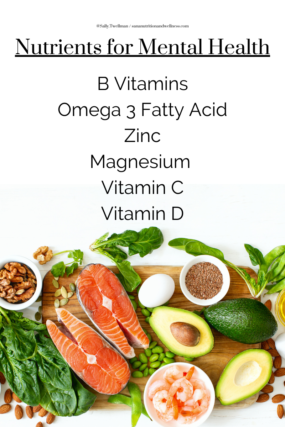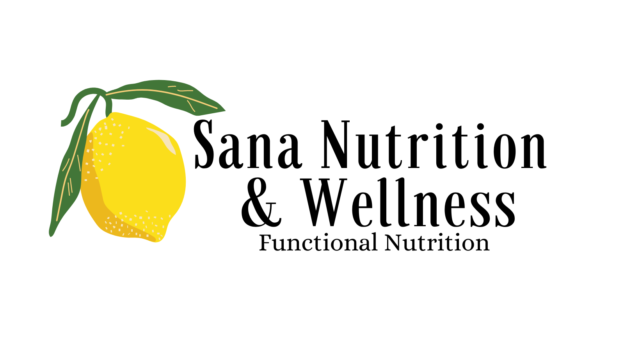What we eat impacts all aspects of our health! For example, we know the connection between Nutrition and Heart health, diabetes, cancer, and GI health, but we don’t often think about the HUGE impact our diet has on our brain and our mood!
Our food is the building material for our body, cells, hormones, neurotransmitters, and every aspect of what makes us up and feel good or bad!

And its important to know that all nutrients are essential. But today, I want to talk about a few Key Nutrients that have a big ole’ impact on our mental health (and physical health…because it all works together!)
Power Nutrients for Your Mental Health
- B Vitamins
- Omega 3 Fatty Acid
- Zinc
- Magnesium
- Vitamin C
- Vitamin D
B Vitamins
- Thiamine (B1)
- Riboflavin (B2)
- Niacin (B3)
- Pantothenic acid (B5)
- Pyridoxine (B6)
- Biotin (B7)
- Folic acid (B9)
- Cyanocobalamin (B12)
- Neurotransmitter production: B vitamins are involved in producing neurotransmitters, which are chemical messengers that allow communication between brain cells. Deficiencies and Insufficiencies in B vitamins can lead to imbalances in neurotransmitters such as serotonin, dopamine, and GABA, which are essential for mood regulation, anxiety, and stress response.
- Energy production: B vitamins are essential for producing energy in the brain. They help to convert food into ATP, the primary energy source for the brain. Low levels of B vitamins can lead to fatigue, lethargy, and poor concentration, which can impact mental health.
- DNA synthesis and repair: B vitamins are involved in the synthesis and repair of DNA, which is essential for the growth and maintenance of brain cells. Deficiencies in B vitamins can lead to DNA damage and impaired brain cell function.
- Methylation: B vitamins are involved in methylation, which regulates gene expression and helps maintain healthy brain function. Methylation requires several B vitamins, including folate, B12, and B6.
Good Sources of B Vitamins: Chicken, Pork, Legumes (lentils, peas, beans), Potatoes Whole Grains, Nuts & seeds, Leafy greens(spinach, kale, collard greens), citrus fruits, avocado
Omega 3 Fatty Acid
- Reduces inflammation in the brain. Chronic inflammation is linked to a number of mental health disorders, including depression and anxiety. Omega-3 fatty acids have been shown to reduce inflammation and oxidative stress in the brain and throughout the body.
- Omega-3 fatty acids support brain cell health and structure. They are essential for forming brain cell membranes and producing neurotransmitters, which are chemicals that transmit signals in the brain. Some studies have suggested that omega-3 fatty acids improve cognitive function and memory in both children and adults. Omega 3 also acts as
- Increase Neuroplasticity: Neuroplasticity refers to the brain’s ability to change and adapt in response to experiences, learning, and environmental stimuli. It involves changes in the strength and connectivity of neuronal networks and can occur throughout the lifespan. Neuroplasticity can include structural changes such as the growth of new synapses, the pruning of under-used and defective synapses, and changes in the shape and size of neurons. And a protein called WTF Brain-derived neurotrophic factor (BDNF) plays an incredibly HUGE role in neuroplasticity. And a diet high in Omega 3 Fatty acids (as well as high in antioxidants and phytonutrients) is linked to high levels of BDNF.
Good sources:
- Fatty fish: such as salmon, mackerel, sardines, herring, tuna, trout, and anchovies. (highest source)
- Nuts and seeds: such as chia seeds, flaxseeds, hemp seeds, and walnuts.
- Seed vegetables – kelp and wakame, blue-green algae
- Supplements: such as fish oil or krill oil supplements.
Zinc
- Involved in neurotransmitters regulation – including dopamine, norepinephrine, and serotonin,
- Critical in the metabolism of gamma-aminobutyric acid (GABA). An inhibitory neurotransmitter that helps to regulate anxiety, sleep and stress.
- Reduces inflammation in the brain – Zinc has been shown to have anti-inflammatory effects. It may help to reduce inflammation in the brain by modulating the activity of various immune cells and signaling pathways that are involved in the inflammatory response.
- Plays a role in neuroplasticity – BDNF baby! That’s right, Zn is needed in the production of the your brain rock star BDNF, as well as the regulating and supporting other receptors and neurochemicals required for neuroplasticity and neurogenesis (the growth and development of new neurons in the brain)
Good sources: shellfish, meat, legumes, nuts & seeds, dairy, whole grains
Magnesium
Magical Magnesium! Mg is such a powerful mineral. It’s an essential cofactor (recipe ingredient) to so many reactions throughout the body. And SO many of aren’t getting enough magnesium and using it so quickly by managing cortisol (stress), blood sugar dysregulation and
- Regulating neurotransmitters: Magnesium plays a key role in regulating the levels of neurotransmitters, such as serotonin, dopamine, and GABA, which are essential for mood regulation, anxiety, and stress. Magnesium acts as a cofactor for several enzymes involved in synthesizing and releasing these neurotransmitters. Research has shown that magnesium deficiency can lead to imbalances in neurotransmitter levels, which may contribute to the development of mental health disorders.
- Modulating the stress response: Magnesium helps to regulate the activity of the hypothalamic-pituitary-adrenal (HPA) axis, the body’s central stress response system. Magnesium deficiency increases the activity of the HPA axis, leading to an overactive stress response and increased levels of stress hormones, such as cortisol.
- Maintaining neuronal integrity: Magnesium maintains the integrity and stability of neuronal membranes, which are essential for normal brain function. Magnesium deficiency can lead to alterations in neuronal membrane structure and function, which may contribute to developing neurological and mental health disorders.
- Enhancing sleep: Magnesium plays a key role in promoting relaxation and reducing stress, which can help to improve sleep quality. Magnesium has been shown to enhance sleep quality and reduce the incidence of insomnia, which is a common symptom of several mental health disorders.
Good Sources:
- Dark leafy greens: Spinach, kale, and Swiss chard
- Nuts and seeds: Almonds, cashews, pumpkin seeds, and sunflower seeds
- Legumes: Beans, lentils, and chickpeas are all rich in magnesium.
- Whole grains: Brown rice, quinoa, and whole wheat
- Fish: Salmon, mackerel, and halibut
- Dairy: Milk, yogurt, and cheese
- Dark chocolate ( Ya, baby! )
Vitamin C
This vitamin is one of the most potent and well-known Vitamins for physical health, so it’s no surprise it’s a key to our mental health too!
- Powerful antioxidant – Vitamin C is a powerful antioxidant that helps to protect the brain from oxidative stress, which is a major contributor to the development of neurodegenerative disorders such as Alzheimer’s and Parkinson’s disease. By neutralizing free radicals, vitamin C helps reduce brain cell damage and preserve cognitive function.
- Neurotransmitter synthesis: Vitamin C is involved in the synthesis of several neurotransmitters, including dopamine, norepinephrine, and serotonin, which are essential for mood regulation, motivation, and cognition. Vitamin C is required to convert dopamine to norepinephrine and synthesize serotonin. Deficiency can lead to imbalances in these neurotransmitters, which can contribute to developing mental health disorders.
- Stress reduction: Vitamin C is involved in regulating the hypothalamic-pituitary-adrenal (HPA) axis, which is the body’s central stress response system. Vitamin C helps to reduce the release of cortisol, a stress hormone, improve mood and reduce symptoms of anxiety and depression in some studies.
- Immune system support: Vitamin C is crucial in supporting the immune system, essential for mental health. Chronic inflammation and immune dysfunction have been linked to several mental health disorders, and vitamin C helps reduce inflammation and support immune function.
Good sources:
- Citrus fruits: Oranges, lemons, limes, grapefruits, and tangerines
- Berries: Strawberries, raspberries, blackberries, blueberries, and cranberries are all high in vitamin C.
- Kiwifruit
- Melons: Cantaloupe and honeydew melons
- Tropical fruits: Pineapple( contains bromelain, an enzyme that has anti-inflammatory properties), Mango, Papaya
- Colorful Vegetables: Red and green peppers, Tomatoes (also contain lycopene, a powerful antioxidant) and broccoli
Vitamin D
This is an exciting vitamin for many reasons, but it acts more like a hormone (it makes things happen; it’s a go-getter!) than a traditional vitamin, and our body makes it. It plays a critical role in over health but is especially important in the brain.
- Mood regulation: Vitamin D plays a role in regulating mood and reducing symptoms of depression. Vitamin D receptors in the brain synthesize serotonin, an essential neurotransmitter for mood regulation.
- Cognitive function: Vitamin D is involved in several cognitive processes, including attention, memory, and learning. Low vitamin D levels is linked to impaired cognitive function and an increased risk of cognitive decline.
- Neuroprotection: Vitamin D has neuroprotective properties, which means it helps to protect the brain from damage and may reduce the risk of neurodegenerative diseases such as Alzheimer’s and Parkinson’s.
- Immune system support: Vitamin D plays an essential role in regulating the immune system, which plays a role in mental health and brain health. Low vitamin D levels have been associated with an increased risk of autoimmune disorders and chronic inflammation.
- Sleep regulation: Vitamin D may play a role in regulating sleep patterns, essential for mental health. Studies have shown that low vitamin D levels are associated with poor sleep quality and sleep disorders.
Good Sources:
- Fatty fish: Salmon, tuna, mackerel, and sardines are all good sources of vitamin D.
- Egg yolks: Egg yolks contain small amounts of vitamin D, but the concentration can vary depending on the source of the eggs.
- Mushrooms: Some types of mushrooms can produce vitamin D when exposed to UV light, so look for mushrooms that have been specifically grown or exposed to UV light.
- Sunlight: This is our biggest source of Vitamin D. So get out in the sun for 10-30mins daily.
*Important to note that we need certain minerals present in our body in order to make Vit D and use the Vit D from our food.
- Magnesium
- Zinc
- Phosphorus
- Calcium
- Copper
So what we eat significantly affects our mental and brain health. In this article, I only talked about how the right foods can support your mental health, and some foods negatively impact your mental health, like highly processed foods, lots of added sugar, additives, and the artificials (colors, sweeteners, fillers), high saturated fats…the usual suspects. So focus on whole foods, lots of fruits and vegetables, beans, whole grains, seafood, good quality meat and healthy fat!
This is what a typical day could look like Nourishing your mental health!
Day 1:
Breakfast:
- Power Smoothie (Blue Berries, Spinach, Flax seeds, 2 brazil nuts, Protein Powder)
Lunch:
- Tuna Salad Sandwich on whole grain bread, with avocado, tomato and lettuce. Side of cucumbers and carrots.
Snack:
- Boiled egg and peppers
- Mint Green Tea
Dinner:
- Chickpea and Lentil Coconut Curry with brown rice and cauliflower
Day 2:
Breakfast:
- Greek Yogurt with strawberries, pumpkin seeds, and chocolate hummus
Lunch:
- Chicken Ceasar Salad with Sardines, Farro (whole grain), Walnuts, and Lemon Caesar dressing
Snack:
- Sliced Pear with Almonds
- Tumeric Ginger tea
Dinner:
- Tacos El Pastor (Pork, Pineapple, OJ, Chili Powder, onions, garlic, cilantro) + Black Beans + Spinach Salad




